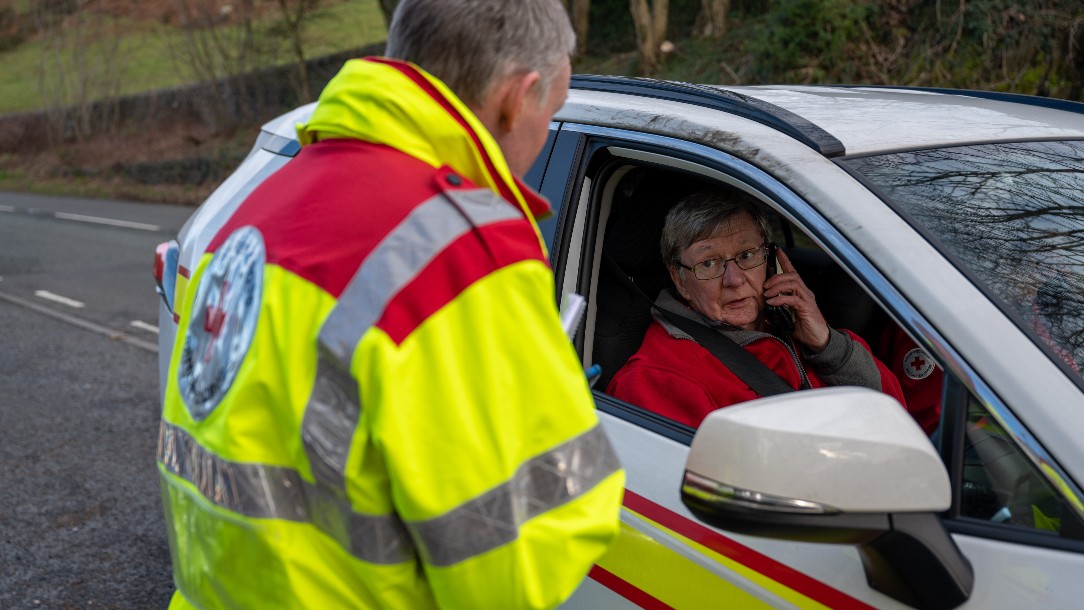The mothers in Zimbabwe growing their own: “I know my family will always have a home-grown, nutritious meal”
In a region hit by climate crisis, the Red Cross is supporting mothers and mothers-to-be to grow nutritious food in sustainable gardens
Last updated 4 August 2023
“I like tasting the food while cooking,” says Lucky, a 38-year-old mother from Zimbabwe. “It makes me happy, and it keeps my stomach full.”
Lucky tends to a stew of fried green bananas, tomatoes and onions, before starting on a local delicacy of pumpkin porridge with roasted peanuts. She will add spinach and broccoli later.
As Lucky cooks, she explains how she came to be involved with the garden that grew most of the ingredients she’s now simmering.

Food cooked by Lucky, and grown in the garden at the Chibuwe Health Clinic
PHOTO: Patrick Majarira/IFRC
The garden is located in Chibuwe Health Clinic in south-eastern Zimbabwe. It is tended largely by pregnant women and new mothers like Lucky, who visit the clinic for pre-natal and post-partum care.
The garden was started several years ago as part of a larger initiative by the Zimbabwe Red Cross and the British Red Cross, after health workers at the clinic witnessed worsening nutrition levels among women and children.
Learning techniques to combat the effects of climate change
The region is hit hard by the effects of climate change. Drought, cyclones, and flash floods destroy many of the fruit, legumes and root crops that would ordinarily provide communities with the vitamins, minerals and protein needed for good health.
It is estimated that roughly a third of children under five in this area are malnourished. Sadly, Covid-19 has made the situation worse, disrupting regional and local food distribution systems. Often, people rely on sadza, which is a thick porridge made from cornmeal and water, and a limited range of leafy vegetables.
“It’s hard for expectant mothers in this community to get a decent meal,” says Robert, a nurse at the Chibuwe Health Clinic. “So, the vegetables that are grown in the clinic garden help them to get a well-balanced meal.”
Most of the plants and vegetables are sustained entirely by the clinics and communities around them, with support from local agriculture experts and local Zimbabwe Red Cross volunteers.
Even so, growing your own food in an environment like this is hard. As the weather gets gradually drier, hotter and more hostile, the boiling heat evaporates water quickly, which can kill young seedlings.
THE VEGETABLES THAT ARE GROWN IN THE CLINIC GARDEN HELP EXPECTANT MOTHERS TO GET A DECENT MEAL.Robert, a nurse at the Chibuwe Health Clinic
“At the clinic garden, we were taught smart agriculture techniques as a way of combating the effects that climate change is having on our harvest,” says Beauty, another new mother who works at the Chibuwe Health Clinic garden. “We learnt techniques such as conservation farming and mulching.”
Techniques like these are crucial in an environment where farming is getting more and more difficult.
“Temperatures have continued to rise and this has resulted in regular, violent winds that have destroyed our homes,” says Lucky. “We also get floods which also contribute to the destruction.”

Lucky and Beauty pose with one of the plants they grow in the garden.
PHOTO: Patrick Majarira/IFRC
Reaching communities on the front line of climate change
Communities in places like Chibuwe are on the frontline of climate change, which is happening on an enormous scale, fast. Extreme weather events like floods, storms and droughts are on the rise every year, and the health, homes and livelihoods of so many people around the world are at risk.
WITH THE GARDEN, I KNOW MY FAMILY WILL ALWAYS HAVE A HOME-GROWN, NUTRITIOUS MEAL.Lucky
The British Red Cross has always been here to get people through emergencies, whether they occur at home or around the world. We’ve been supporting people affected by climate-related disasters for decades. But it’s not just what we can do after an extreme weather event. It’s also supporting women and girls like Lucky and Beauty in places where the climate is changing, so that they can keep their families fed and healthy.
So far, the garden is a success. As well as providing nourishing ingredients for the hearty meals Lucky makes for her family, it has been the basis of the friendships she has made while tending the garden, and the joy of seeing seeds she’s planted grow.
“I love gardening,” says Lucky. “The green nature of it warms my heart. With the garden, I know my family will always have a home-grown, nutritious meal.”
Read more about our work in climate change

The British Red Cross responds to Storm Eunice
Storm Eunice is the worst storm to have reached the UK in 30 years. The British Red Cross has been preparing to reach those worst affected

Zimbabwe: from food crisis to hope
By JB Gill, TV presenter and former band member of JLS

Our commitment to climate change
People are feeling the impact of climate change now, and humanitarian needs are increasing day by day.